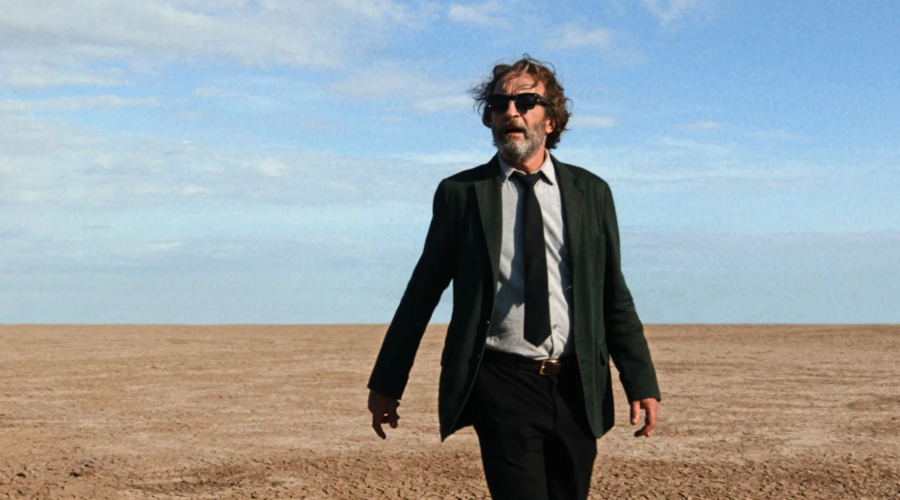Alejandro G. Iñárritu returns to the big screen (depending on the size of your television) with his autofictional epic BARDO, False Chronicle of a Handful of Truths. The film is the first feature Iñárritu has made entirely in Mexico since his 2000 debut attempt Amores perros.
BARDO finds the director at his most self-reflexive. He’s reached that point in life where he is certain his youth is behind him and has now taken on the unique burden (as a lot of successful writers and directors tend to do) of telling his own story. For how much success he has had, Iñárritu has maintained a healthy stable of detractors. And it is unlikely that this film is going to win them over.
But there is no doubt that his fans will consider this one a masterpiece.
About half an hour into this 159-minute long plotless endeavour, Iñárritu’s ostensible character stand-in, a Mexican documentarian and journalist named Silverio (played by an excellent Daniel Gimenez Cacho) wonders out loud, after blowing off an appearance on a Mexican talk show out of fear of being humiliated, why he seeks the approval of those who despise him. Some could choose to see this as a healthy dose of self-awareness but to acknowledge such proclivities in oneself and still swerve into the skid is the laziest kind of cynicism. And Iñárritu is aware of this. It is precisely this pretension masking as pretentious self-immolation that gives the film its bite. Written down, the ideas sound unbearable and when one sees them on the screen they are still unbearable but also deeply fascinating.
The film follows Silverio, a Los Angeles resident, as he returns to Mexico on vacation with his family. He is set to win an award in America in a few weeks and he has something of an existential crisis. He feels he has spent too long pandering to an American audience that will never make a home for him and has consequently lost his real home in Mexico. He is nowhere, a theme laughably obvious several times in the film.
One particularly egregious instance finds Silverio demanding his son, Lorenzo (Iker Sanchez Solano trying his best) speak Spanish while they are in Mexico, only to have his son chastise him for cosplaying a Mexican. This moment is particularly frustrating because it comes on the heels of one of the most virtuoso scenes in the film: Silverio playfully chases his wife Lucía (Griselda Siciliani) through the house and they end seamlessly travelling to the past, before they left Mexico. The movement is gorgeous and enthralling and when we watch the couple lie in bed together the evocation of their love is palpable.
In another wonderfully crafted scene, Silverio converses with Hernan Cortes upon a mountain of corpses in what we assume must be a surrealist fever dream. We watch the pair have the most entry-level discussion on colonialism possible for a while before it is revealed that the scene is really just the set of Silverio’s latest docufiction. At an earlier point, the character had been criticised for inserting himself into the documentaries he made about historical figures but Iñárritu is showing us how compelling such a gimmick could be. And then pulls back to assure us that he is aware that it is still a gimmick.
These flights of surrealist fantasy and counter-fantasy are interwoven throughout the film. And while, at a stretch, one may find that they express some sort of thematic resonance, they give the impression that Iñárritu either doesn’t trust his audience or doesn’t trust himself. And though the end of the film recontexualises the oneiric manner of the preceding film, it would have been enjoyable to have Iñárritu engage with these sequences at face value.
BARDO is at its most moving when it engages with the story thread of Silverio and Lucía’s dead first son. The film opens with Silverio’s impressionistic recollection of the boy’s birth and death, and for the remainder of the runtime we come to understand the toll this loss takes on the couple. At various moments Silverio’s (and Iñárritu’s) imaginations conjure up a miniature representation of the child that he is unable to let go of. The conclusion of this story thread is one of the points Iñárritu’s fans are likely to bring up in his defence and they are right to do so. But wouldn’t it be nice if the film did more of that?
BARDO, False Chronicle of a Handful of Truths is often stunning and awash with the emissions of a brilliant creative force that drive the moments of human tenderness into heart-breaking territory. But it suffers from the condition that autofiction often reveals about human beings. We almost never have anything interesting to say about ourselves but are unable to resist the urge to talk about nothing else.

